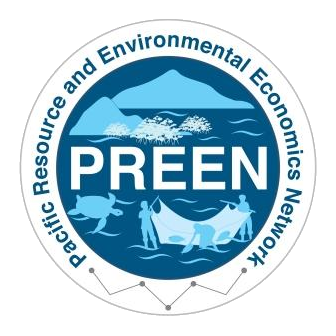Pacific Resource and Environmental Economics Network
 What is PREEN?
What is PREEN?
The Pacific Resource and Environmental Economics Network (PREEN) is a body of professionals working together to promote and mainstream the use of economics in environmental management within the Pacific region. The PREEN was established in 2009 to build support among practitioners and to increase the capacity of stakeholders to conduct and or benefit from the economic analysis of natural resources and the environment.
Among other activities, such as providing a forum for practitioners to exchange information and access peer support and advice, the PREEN maintains a web site to support the applied economic analysis of natural resources and the environment in the Pacific. For more details of the PREEN, its origins, objectives and information, see PREEN website.
The PREEN was established in 2009 and has over 30 members spanning 18 organisations including 5 Regional Organisations and 10 countries.
Functions of PREEN
Provide a forum for practitioners in Pacific resource and environmental economics to exchange information, ideas and experiences for mutual learning and professional development
Provide peer review support and advice
Establish and maintain a database of key resource and environmental economics practitioners in the Pacific, outlining their contacts, areas of expertise and interest
Develop, as appropriate, joint proposals or work to meet the needs of the Pacific
Establish and maintain a web site to support the applied economic analysis of natural resources and the environment in the Pacific.
Relevance
The use of resource and environmental economic analytical information to support and or underpin economic development and environmental conservation decisions is relatively new in the Pacific. Resource management has conventionally either not involved consideration of economic factors at all or has involved it only inadequately. Similarly environmental conservation decisions often did not include livelihood or opportunity cost considerations. The failure of some environmental or natural resource management initiatives has consequently been attributed to the poor policy or project design arising from that economics gap.
Part of the reason for inadequate consideration of economic issues in natural resource management is the lack of capacity in natural resource economics in the Pacific. Many Pacific island country governments do not have the resources to employ dedicated natural resource economists in their administration. In any event, there are few trained resource and environmental economist around to employ; most economics graduates find employment in the financial, macroeconomic or general planning sector while others may move overseas or not use their economics training at all. For those few natural resource economists that do operate in the Pacific, progress in conducting economic analysis can be hampered by isolation; there are few resource economists around with whom to share ideas, develop initiatives or share work.
Establishment of the Network
In response to these issues, IUCN-Oceania organized a small gathering of practising resource economists and other interested people in 2007 to form a Resource and Environmental Economics Network (REEN). The purpose of the Network was to provide peer support and share ideas to progress economic analysis for sustainable resource management in the Pacific.
In September 2009, IUCN hosted Experiences in the Use of Economics in Resource and Environmental Management, a Pacific Resource and Environmental Economics Practitioners’ Workshop. The workshop brought together known resource economists operating in the Pacific who were able to make themselves available to discuss current issues and share experiences.
At the September meeting, participants confirmed the ongoing need for a network of resource and environmental economists to build support among practitioners and increase the capacity of stakeholders to conduct and or benefit from the economic analysis of natural resources and the environment.
In light of this, participants agreed to formally establish the Pacific Resource and Environmental Economics Network or PREEN for short.